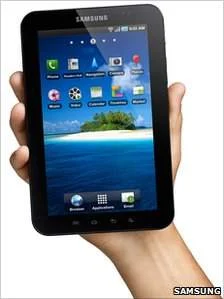Verizon is trying to stand up for Samsung and the company’s Galaxy Tab tablet, which wants to compete against Apple’s iPad but may have a hard time due to a high launch price.
When Samsung first unveiled the Galaxy Tab, it was very staunch about not announcing the price. That was a dead giveaway that it was probably going to be expensive, and that ended up being the case.

The Galaxy Tab is smaller than the iPad, less of a known quantity, and runs on a free operating system. So the fact that mobile carriers are pricing the unit at $600, which makes it in the exact same price range as the iPad, take a lot of value away from the device.
Some carriers will offer subsidies if customers sign up for a service contract, but Verizon isn’t doing that. If someone buys a Verizon Galaxy Tab, they’ll have to activate it with Verizon service, but can sign up for month-to-month service. No contract required.
Tablet data pricing from Verizon clocks in at $20 per month for a 1 GB cap, and extra charges for data expenditure beyond that.
At $600, the Galaxy Tab will be the same price as the version of the iPad that Verizon just started selling. But, Verizon points out, that iPad only has Wi-Fi connectivity. The Galaxy Tab is a more versatile device because of its 3G capabilities, but because of the way mobile data technology is structured, Galaxy Tabs won’t easily be switchable between providers. So, if someone buys a Galaxy Tab from Verizon, they can’t then decide to start using T-Mobile data service.
So, offering the tablet as a standalone, no-contract product really doesn’t do much to add to the value proposition. But Verizon says it does.
“Verizon Wireless has always been committed to providing customers with the latest technology, and the latest announcements reflect that commitment to a relatively new entrant into the mobile arena — tablets. The data plan pricing for the tablets are reflective of how people use these multipurpose devices, and because they are 3G- and Wi-Fi-enabled, customers have a choice in how, when and where they use them,” said Verizon spokesperson Brenda Raney.






